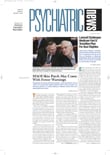The idea that the therapeutic alliance is important for clinical improvement was foreshadowed by Freud's comments on the positive feelings that develop between doctor and patient. Although the concept has emerged historically in the psychodynamic literature, the strength of the patient-therapist relationship has been recognized as crucial by therapists from different theoretical backgrounds.
Efforts to improve the therapeutic alliance, a key component in effective psychotherapy, sometimes appear to be marginalized in current psychiatric practice.
Three major forces have shaped psychotherapy training in psychiatry residency programs during the past two decades: the progress of neurobiology, the impact of managed care, and the need to demonstrate accountability in a measurable manner. Reimbursement trends favor psychopharmacologic management and use of brief, focused psychotherapy. In such a clinical climate, treatment sessions can seem hurried, limiting the establishment of an ideal therapeutic relationship.
The therapeutic alliance is reflective of our interactions with patients over time. Besides being directly therapeutic, our manner of interaction is often the major factor determining patients' future compliance with medication regimens and clinic visits. Optimizing the ability to communicate with patients effectively should therefore be a priority in psychiatric training.
In 2001, the Psychiatry Residency Review Committee of the Accreditation Council for Graduate Medical Education responded to changing trends in psychiatric training by establishing competency requirements in five psychotherapy modalities. Experience with individual modalities, however, needs to be complemented by a general competency in more subtle verbal and nonverbal communication skills that can contribute to clinical improvement. Awareness of transference and counter-transference is essential for a successful treatment outcome, as is understanding the significance of defense mechanisms in our patients.
Refining our interactions with patients requires awareness of areas that need improvement. One-way mirrors can be very useful for observation of a resident's clinical interview, with minimal discomfort to the patient. A supervisor can then provide feedback about the interaction that could generate a better immediate or long-term response from the patient.
Many residency programs videotape clinical sessions for teaching interviewing and psychotherapy. After viewing the tape together, the supervisor typically elicits comments from the trainee regarding the trainee's opinion of relevant theoretical and technical issues. Such feedback addresses the resident's functioning within a particular treatment model as well as verbal and nonverbal behaviors shown by the therapist and patient.
Video recording can capture the patient and the therapist face-on in a mirror placed beside the patient. This allows a frontal view of patient and therapist simultaneously, using one camera. Other recording approaches include use of a split-screen or picture-in-picture device with two cameras or use of a wide-angle lens to capture both participants side-on.
Regular training sessions should be complemented by seminars in which residents can learn relevant theoretical aspects in an interactive fashion. The supervisor may provide a broad range of videotapes that illustrate various technical aspects of the therapy being studied and demonstrate incidents in which therapist-related problems interrupted the treatment relationship.
Videotape review is also an excellent means to study treatment outcome with various psychotherapy models. Behavioral changes may be observed in patients when comparing pretherapy to posttherapy segments, which may not be reflected in their self-reports. With the use of standardized adherence criteria, tapes can be reviewed blindly to demonstrate change in therapist behaviors over the course of training. Hence, videotaping can be a vehicle for research in psychotherapy education.
Audio recording of clinical sessions is generally considered inferior to video recording but can be useful when improvement mainly in verbal communication is desired. Occasional use of brief patient questionnaires addressing interactions with residents can provide useful feedback to faculty regarding areas needing improvement. If several patients report an inadequate alliance with a trainee, it may suggest the need for closer individual supervision.
Qualified teachers are essential for trainees to learn how to improve communication with patients, and well-equipped training facilities and demonstrative videotapes need to be available in training programs. Videotapes for learning psychotherapy and interviewing techniques can sometimes be obtained from psychotherapy institutes or through commercial sources. A psychodynamic therapy video may also be purchased and viewed online through the APA Web site at<www.psych.org/edu/gabbard.cfm>.
A distinctive feature of psychiatry is its use of multiple treatment modalities, which include nonbiological approaches. Psychiatrists are generally assumed to have superior skills in interacting with patients and to be able to respond appropriately in times of emotional crises.
We can only stand to benefit by maintaining this image of our profession and to continue to enhance therapeutic skills in trainees. ▪

